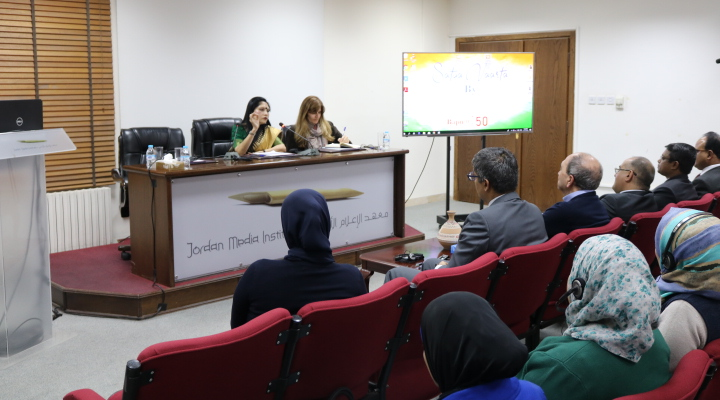
Amman – In marking Mahatma Gandhi’s 150th birth anniversary, the Ambassador of India to Jordan, H.E. Mrs. Shubhdarshini Tripathi, delivered a lecture at the Jordan Media Institute (JIM) where she spoke about Gandhi’s most distinctive characteristics.
At the beginning of the lecture, Her Excellency emphasized the positive bilateral relations between Jordan and India and the significance of His Majesty King Abdullah II’s latest visit to India which resulted in several fruitful agreements in the fields of customs, defense, phosphate, culture, health, medical sciences, as well as labor and media.
Tripathi called on the need for embracing Gandhi's ideology –as we live in a chaotic world filled with turmoil– which promotes honest and courageous forgiveness of others, love for all, the need of psychological and spiritual strength rather than physical power and armed forces, as well as the protection of the rights of minorities and vulnerable groups.
"Gandhi is a global leader who earned the respect of people from all around the world regardless of their race and religion," she said. "Gandhi’s school of thought went beyond religions and sects, his indefinite philosophy and his belief in human values made him the most influential figures of modern times," Tripathi added.
"Gandhi is not a saint, he grew up like any other ordinary Indian citizen, but he saw the world in full. His ideology extended beyond the borders of India and reached the whole world. He was able to reap the fruits of his philosophy after a struggle that lasted for 25 years. Gandhi has always insisted that a person must start the change from within before asking others to do so,” she explained.
For his part, JMI Dean Dr. Basim Tweissi, noted the current need for someone like Gandhi along with his moralities, values and his faith in the greater good.
Gandhi has managed to liberate his country without fighting wars against an empire that was known for being violent and oppressive. He made the Indian nation a nation of geniuses after decades of occupation and marginalization, Tweissi stressed.
Tweissi compared a culture of nonviolent and civil resistance, which succeeded in securing rights and achieving liberation, with the bloody conflicts in today's world and the killing of millions of people. "Part of what was spent on these wars was enough to eradicate poverty in the world,” he added.
Gandhi believed in the freedom of the press and the media in addition to its role in serving society and expressing the public opinion. Press should not be used to reap money and accumulate profits, Tweissi concluded.
The lecture also featured a short film about Gandhi’s wisdom as well as quotes from his speeches that highlight spiritual resistance to violence and call for national liberation.



